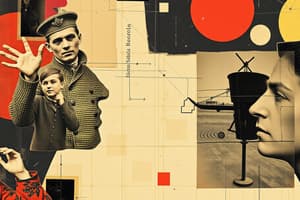Podcast
Questions and Answers
Which of the following best defines 'media' in the context of communication?
Which of the following best defines 'media' in the context of communication?
How does social media primarily affect the way people communicate?
How does social media primarily affect the way people communicate?
A breaking news story is reported differently across various news channels. What does this situation most likely demonstrate about media's effect on communication?
A breaking news story is reported differently across various news channels. What does this situation most likely demonstrate about media's effect on communication?
You want to raise awareness about a local environmental issue. Which media strategy would be most effective in reaching and engaging your community?
You want to raise awareness about a local environmental issue. Which media strategy would be most effective in reaching and engaging your community?
Signup and view all the answers
Which of the following concepts would be most crucial to incorporate in designing a new form of media that fosters meaningful dialogue on complex issues?
Which of the following concepts would be most crucial to incorporate in designing a new form of media that fosters meaningful dialogue on complex issues?
Signup and view all the answers
Which of the following best describes the primary focus of media literacy?
Which of the following best describes the primary focus of media literacy?
Signup and view all the answers
Which literacy type does the statement 'Information literacy is crucial for fact-checking in the digital age' most closely relate to?
Which literacy type does the statement 'Information literacy is crucial for fact-checking in the digital age' most closely relate to?
Signup and view all the answers
Teaching students to cross-reference information from multiple sources addresses fake news. Which literacy type does this strategy primarily enhance?
Teaching students to cross-reference information from multiple sources addresses fake news. Which literacy type does this strategy primarily enhance?
Signup and view all the answers
Which of the following scenarios best demonstrates the application of technology literacy?
Which of the following scenarios best demonstrates the application of technology literacy?
Signup and view all the answers
Evaluate the statement: 'The ability to create a blog post is an example of media literacy.' How accurate is this claim?
Evaluate the statement: 'The ability to create a blog post is an example of media literacy.' How accurate is this claim?
Signup and view all the answers
Traditional media always includes interactive elements.
Traditional media always includes interactive elements.
Signup and view all the answers
Which of the following is an example of traditional media?
Which of the following is an example of traditional media?
Signup and view all the answers
What is a key characteristic of new media?
What is a key characteristic of new media?
Signup and view all the answers
Which term describes the convergence of traditional and new media?
Which term describes the convergence of traditional and new media?
Signup and view all the answers
How has new media impacted the consumption of traditional media?
How has new media impacted the consumption of traditional media?
Signup and view all the answers
Study Notes
Media and Information Literacy
-
Definition of Media: Media encompasses the channels through which information is transmitted, rather than just physical devices or organizations.
-
Impact of Social Media on Communication: Social media facilitates instant and widespread sharing of information, transforming conventional communication methods.
-
Media's Role in Perception: Different reporting by various news channels illustrates how media can shape public opinion through selective reporting.
-
Effective Media Strategies: To raise awareness about environmental issues, creating a viral social media campaign is more effective than traditional methods like academic publishing.
-
Designing New Media: A platform encouraging multiple perspectives is essential for fostering meaningful dialogue around complex issues, rather than limiting communications or using only emojis.
-
Focus of Media Literacy: Media literacy emphasizes the ability to critically analyze and evaluate media messages, crucial for informed consumption.
-
Relationship of Information Literacy: Information literacy is essential for fact-checking in the digital age, highlighting its close relation to media literacy.
-
Addressing Fake News: Teaching cross-referencing of multiple sources primarily enhances information literacy, a strategy for combating misinformation.
-
Technology Literacy Example: Utilizing advanced search operators to locate scholarly articles effectively reflects the application of technology literacy.
-
Creating Blogs and Media Literacy: While creating a blog post involves media, it also intersects with technology literacy, indicating a partial accuracy in its classification.
-
Traditional Media Characteristics: Traditional media typically does not include interactive elements, indicating a stark contrast with new media.
-
Examples of Traditional Media: Newspapers stand out as a classic example of traditional media, distinct from modern platforms like social media or podcasts.
-
New Media Characteristics: Interactivity is a defining feature of new media, promoting user engagement as opposed to one-way communication.
-
Media Convergence: The merging of traditional and new media is termed as media convergence, illustrating the evolution of information dissemination.
-
Impact of New Media on Traditional Media: New media has enhanced accessibility to traditional media but has not entirely replaced it, indicating a transformation rather than a complete substitution.
Studying That Suits You
Use AI to generate personalized quizzes and flashcards to suit your learning preferences.
Description
This quiz assesses the knowledge of Grade 11 students in Media and Information Literacy. Students will respond to multiple-choice questions that cover key concepts in the subject. It is designed to evaluate their understanding of the media landscape and information ethics.




